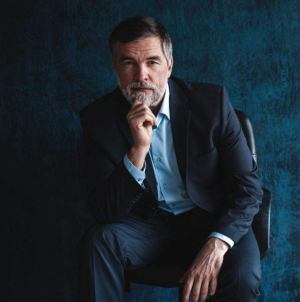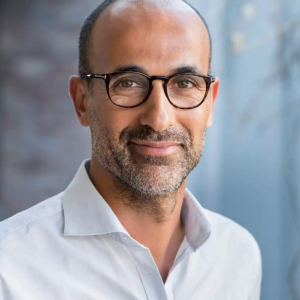
VC – The Barrett Group’s CEO Interviews Managing Director of Allos Ventures
The Barrett Group’s CEO Peter Irish interviews David Kerr, Managing Director at Allos Ventures as they discuss the challenges and opportunities within Venture Capital
Peter Irish: Hello there. Welcome to this edition of the Hiring Line. I’m Peter Irish with the Barrett Group, and it’s my great pleasure to welcome David Kerr from Allos Ventures today. David, would you be so kind as to introduce yourself?
David Kerr: Sure. Peter, thank you for having me on today. My name is David Kerr. I’m the managing director at Allos Ventures. Allos is a venture capital fund based in Indianapolis, Indiana. We are a fund that is focused on business- to-business (B2B) software-as-a-service (SAAS) companies. Allos invests at a very early stage; at the seed stage, the seed plus stage, and the Series A stage. We focus on companies that are headquartered in the U. S. Midwest. So, we feel like that’s been undercapitalized, underserved area for many years, and so that’s where we target our companies and our founders. We have a few things that are outside of that geography, but for the most part, that’s where we are focused.
And prior to that, I’ve spent the last 25 years as an operator. I’ve been a CEO, a COO and a general manager at all sorts of companies, tech companies and tech-enabled service companies. Everything from a three-person startup to Groupon and kind of everything in between as I’ve been in that operating phase of my career before I moved into venture capital.
Peter Irish: So, David, it’s great to know that you’ve come up through the ranks in terms of operational roles, and you’re now in a more strategic role, running whole portfolio companies. I wonder if you could tell us what you do from day to day. What’s your current role and responsibility?
David Kerr: Sure. Venture capital really focuses around, or at least where we invest, the stage we invest, around four different specific areas. One is fundraising. We have to go convince limited partners to be part of our fund. And those are institutions, those are high net worth individuals, those are family offices. And we have to convince them that we are good stewards of their money and that our thesis and our approach is one that will give them returns that they’re looking for. So fundraising is one of those pillars.
The second one is sourcing deals. So, we are always on the lookout. We participate in all kinds of events. Marketing and outbound marketing initiatives are important. We go to accelerators and incubators and folks like that. And what we’re doing is we’re looking for entrepreneurs that are starting businesses that fit within our thesis. So, sourcing deals is the second part of it.
Then you have to win the deal. There is lots of capital out in the marketplace right now and lots of competition. And so you have to convince that entrepreneur that, assuming they want more than just capital, that you bring additional value-add to the table. Then, once you win the deal, it’s working with the portfolio company in whatever areas that they need. Whether that be building a leadership team, or go to market, or thinking about product and pricing, product market fit, and then, typically, once you’ve gotten on the venture capital train, it’s finding that next round of funding. So, then we introduce them to the deeper pockets that are in the later stages.
And then, the fourth area is really what would be considered the harvest phase. Once you’ve gotten it to a certain level, we are typically in these deals for 7 to 10 years, then it’s finding what is the appropriate exit path and exit ramp for the company. So that we are able to return capital to our limited partners. So those are the four, maybe five, with a sub-bullet in there, areas that we that we focus on, that I spend my days on.
We have fully invested in three funds. Right now, I’ve been a part of one fund, Allos 3. We have assets under management of about 150 million. And in those first three funds, we have approximately 40 companies. In our Series A, we have a higher concentration. So, in Allos 3, we have 15 companies that are Series A where we’ve invested a higher number of dollars. And then we also have an Alpha Program where we do some investments into companies that we hope will mature into a Series A that we can be in a position to lead that. But overall, over those first three funds, it’s roughly 40 companies.
Peter Irish: That sounds like a fascinating role, and I think many could be envious of your responsibilities. But, David, I know your business faces a lot of challenges and opportunities and also your portfolio companies. I wonder if you could tell us a little bit more about that. What sort of challenges? What sort of opportunities are you currently facing?
David Kerr: Well, so I think there is two areas I’d like to talk about here. One is the business. The challenges we face as a venture capital firm. And two would be the challenges our portfolio companies face. From a venture capital firm, the challenges we face in the US right now, there are more than 1,000 venture funds that are under $100 million. There’s a lot of competition, both for limited partners in those funds, and then for allocation of capital.
And then, you know, over $100 million – I don’t know what the numbers are, but my guess is there’s another 1,000 plus. Some are the very well-known, marquis brand kind of funds that you are competing with. So, part of it is competition for deals and part of it is competition for limited partner dollars. I would say what Covid has done is it’s really opened [the market]. Used to be the concentration of capital is in Silicon Valley, New York, Boston, and then you kind of move to some other areas, like Austin, Texas, and areas like that.
But 70-80% of all venture capital has historically gone into Silicon Valley area and the Northeast part of the U. S. Now, after Covid, people are doing deals over Zoom. So it has broadened the competition, I would say. Because people can come into Indianapolis or Madison, Wisconsin, or wherever and still be very competitive there. So that’s a challenge that we face.
And then let’s state from our portfolio companies. The challenges they faced with the challenges that every company that’s going from zero to a million dollars or a million dollars to five or $10 million spaces it is attracting and retaining talent. Especially on the leadership side of things, because, you know, you talk about your network of executives, they’re in a heated competition to attract those folks, and now, especially with remote work or hybrid remote, makes it even more competitive.
And then, just as the general nature of that stage of company, you are trying to convince typically, since we do business to business, these larger enterprises, that you are credible and valid and can deliver a solution that is going to meet a need. Maybe you are a 10-person company or a 20- or 30-person company, and you are trying to serve a big company that is publicly traded and has 30,000 employees.
Peter Irish: Well, for understandable reasons, you focus perhaps more on the challenges. What about opportunities, David? Could you maybe highlight some of the opportunities you see?
David Kerr: I still think we’re really in the nascent stages of the digital transformation. You know, we think about iPhones and iPads and all the automation that we’ve seen. I think there are just tremendous opportunities still, in many companies in the early stages to automate processes, systems, workflows. All these things that that software has not addressed yet. So, I think it is a golden age for an entrepreneur. There is so much capital out there, and there are so many problems that can be solved, can be addressed. So, I think those are massive opportunities that are out there.
The other thing is because there is so much capital out there, depending on the target exit size that you are looking at. You don’t have to go public to have a venture-backed exit. There are plenty of other companies that they are kind of, you know, the bigger fish eating the smaller fish and so on. That gives an entrepreneur an opportunity or a venture fund to exit along the way. So, I think there is still tremendous opportunity, not only here in the US, but then as I look more broadly across the globe. Lots of opportunity for continued digital transformation.
Peter Irish: Let’s shift the conversation to skills and experience a little bit. Obviously, you’ve displayed a great spectrum of skills and experience in getting to where you are. Are there specific skills or kinds of experience that are in demand from your perspective, either for your industry or for your portfolio companies?
David Kerr: So I think, in the venture world, you typically see two paths to venture capital. One is a finance path, and that is typically the most common. And there is almost an apprenticeship type of approach that’s been there. But that’s really being broken up quite a bit, I would say. Younger people entering just are not willing to wait the way that our generation did, and I think it’s a good thing that they are breaking down barriers and so forth. But there’s this finance path into venture.
And then there’s the operating path that I took, which I’m certainly biased towards. Because I feel like I have empathy, understanding, a connection with entrepreneurs that maybe others on the finance side can’t quite have. I know the roller coaster that everybody rides every day of winning a big customer, losing the big customer, getting a new employee, somebody quitting, all those kinds of things. That gives me some appreciation for that. So, I think there’s a couple of paths there to go in.
And then on the portfolio company’s side, typically, what we are investing, it is all about the people at this stage that we are investing in. We don’t have the benefit of years of audited financials and financial engineering and all these kinds of things. So, we’re really looking at the people. The product market fit. And then how do you begin to build a team around that entrepreneur? So typically, the entrepreneur might be a first-time founder that has lived the problem they’re trying to solve. Or they might be a second time founder that has some scars and maybe successes or failures. But they have run into just the grind of what it takes to build a company, and so we look at those folks.
Then it’s how do you begin to build around there? So, when I think about your network, you know, I think we all think this is all 28-year-olds that are getting this venture capital and changing the world. I forget the exact statistic, but I believe most venture backed companies in the most successful ones I want to say the age bracket is somewhere in the mid-forties, mid- to late forties. It’s because experience matters.
And so, I think, not only from a founder perspective, but then building that team around them, whether that be a finance leader, which, typically, founders are like, I can do that, I can outsource that. But it’s somebody that they need early on if they’re going to take venture capital, or a sales or a growth leader, or even a COO. Maybe it’s an over-titled term at a 10- or 15-person company, but somebody that can really think about the operational aspect of those companies and how you scale that to get to $5-, $10-, $20 million.
Peter Irish: Other people in other industries have said to me new skill requirements have of kind of bubbled to the top. For example, a hospital operator said, you know, we have masses and masses of data. We don’t have anybody who can really interpret that data to provide information out of it. So, we’ve been recruiting from big tech and big data sources where we would never have done before. Do you see any kind of shift in the let’s say, still demand?
David Kerr: I’m going to say yes and no. So, I would agree with your comment around the need for not just data scientists but people that are going to operate based on data. Every company that is tech-enabled now or a software company has lots of data and should be data driven and metrics driven, from that perspective. So, I tried and somewhat failed to convince my kids to take statistics in college or in high school or whatever, and really think about kind of the data portion of their future career.
Because I believe firmly that no matter what they do, whether you are a product leader, a sales leader or whatever it may be, that this understanding of data and being able to not only interpret it, and sometimes use a tool like tableau to cut and slice it, and so that you’ve got a better understanding of it. So, I think those are some skill sets.
Also, I think you have to be technically adept. I’ve got a liberal arts background. I don’t have any engineering background and I’ve run engineering teams and software companies and these things. But I think understanding how you connect the dots of software either to help your internal operation or that it can solve problems for customers. So, I think those are areas where people need to adapt. But I also believe where it hasn’t changed is – [referring to the] stage of companies that we are in – is these intangibles. It is scrappiness; grit; curiosity. It is relationship building, team building; and culture building. And so, I think those things are time tested.
Just saying culture building, when I’ve worked back in my twenties, culture was not really a thing. I guess there was a culture there, but it wasn’t a thing. You kind of went in, you did your work that your boss told you to do and showed up on time. And you worked hard. Maybe someday they give you a raise or they gave you a promotion. I do think now really embracing culture, that the generation that is coming to work today, if you are a leader and a manager, helping to foster culture. You can’t create it from the top down but helping to foster that and recognize the benefits of it, it is probably a different skill set that people need to adapt to.
Peter Irish: That’s good to hear, because I was starting to think it’s all about analysis and very intellectual tasks. And what you’re telling me is that emotional intelligence is still important. Would you agree?
David Kerr: I would absolutely agree. And it’s fascinating to me, especially in this competitive world where there’s big pay packages and option packages and things like that. Especially here in the Midwest. I don’t know if it’s a Midwest values kind of thing, but if you can create a culture that people want to be there. They don’t have to believe as much in the product that you’re selling, but the people that are working with the problems we’re solving for customers that back in that can offset some of the compensation. If somebody just comes and says, here’s a big check, but it’s a toxic culture or there is no culture, I’m finding you can retain people or attract people to a company with those kinds of cultures.
Peter Irish: Allegedly millennials are more interested in some of that than they are in the direct compensation, and I can understand why.
David Kerr: I would say it’s more than allegedly. We’ve seen it firsthand that that has worked.
Peter Irish: Now there’s a lot of opportunity. Obviously, as we said behind the whole venture capital or private equity area. For example, your company, you have about 40 portfolio companies if I understand it correctly, and perhaps they have maybe four executives each. So that’s a pool of about 160 executives that you need to manage on an ongoing basis. May I ask what sort of turn sort of turnover is there in that population?
David Kerr: So, I would characterize it by function. Typically, we are investing in a founder. And the company has got real problems if you’re churning the founder/CEO. So, let’s set that one aside. The biggest churn that occurs would be in the go to market team, in the sales and the marketing lead. And I think that’s not just small companies. I think that’s with large companies as well.
Some of that is due to a sales leader is measured based on quarterly performance and things like that. Usually there is a ramp period and people give them a period of time. But sometimes there is either a fit or there is not a fit. And so, you see that, and it could be either way – it could be from the company’s perspective of the individual’s perspective. I wouldn’t say we see a higher amount of turnover in those specifically in the in the sales leadership or the marketing leadership. It’s more stable in a product or engineering and in a finance leadership role. Not that there’s not some turnover or attrition there, but it’s pretty stable.
And then the next stages of companies. So, let’s say the company, we’re kind of $0 to $10 million, and then a bigger check comes in or much, much bigger check comes in. We’re investing in rounds that are $5 million, maybe $10 million, and then then these rounds are like $20, $30, $40 million. Those next rounds there may require a different level of experience in that finance leader, or in that go to market leader, or those kinds of things. So that’s the other area where you’ll see change based on chapter or stage of the company.
Peter Irish: That, of course, makes a lot of sense. Thank you for the perspective. Let’s turn a little bit to your own experience. And I wonder if you might have an anecdote from your own experience that might be inspiring for those people who are still in the process of identifying their next professional role.
David Kerr: So, like I said, about 25 years ago, I moved from non tech roles. I own some companies in the non tech world, little companies that I bought and grown. Then I would be getting into the tech world. And so, I started, as you know, it was an over titled position as president of, like, a three-person startup. When we sold that company, I had an opportunity and ended up taking a role in the acquiring company, which was a much larger one. And then through a whole series of events, I ended up buying our intellectual property back and restarting the company.
And then I sold the company again, and typically in those kind of situations, there is an earn-out period, and you’re required to stay with the acquiring company for a year or two, or whatever it might be. Oftentimes that can be smothering because you’ve been an entrepreneur and suddenly a boss and boss’s boss and just a whole different world. And you’re used to be in kind of cowboy-nation. Hey, we’re going to do this side or the other. In this particular case, I was in my two-year window, and I would meet with my boss. And I’ve been doing the same thing because of this cycle of growing up from three people and selling it and re-buying I and so forth for quite some time. So, I was ready for something new. Every time I’d have my one on one, I would focus on my metrics and what my one on one was about. But I would always say at the end, hey, if there are any other opportunities in the company that I could blend my skills to I’d be happy to do it.
And one day, just in our conversation, he said that our president of Europe just resigned, turned in their termination notice, and we’re going to hire somebody in Europe to do that. But I need somebody to go over there and tend the store for 30 to 60 days. So, I think I can do it and I’m in. You know, that was like on a Wednesday and on the next Monday I was on a plane, and four years later I moved back to the U. S.
My family eventually came with me, but it was, I think, being opportunistic, being patient, but always kind of raising my hand and saying, hey, I’m willing to take on a task that may not seem like it’s really in my wheelhouse. I had no international experience, I had entrepreneurial experience, but I had a willingness and that was a that was genuinely one of the most rewarding, personally, and professionally times of my career that I’ve ever had.
Peter Irish: That coincides very nicely with something I shared in our pre discussion. Fabiano Aguilar, who runs a similar kind of fund, also told me that one of the secrets was always raise your hand when there’s an opportunity, and I think you’d agree with him. Now, do you have any other words of wisdom you might like to share with our executive audience today?
David Kerr: You know, I would say it kind of goes just building off what we were just talking about. I think being opportunistic, and I mean that in the most positive sense. Not taking advantage of a situation but being opportunistic and being willing. I think sometimes people pigeonholed themselves. They think, well, I’ve done this, have been in finance for 20 years. That’s all I could do. Or, I’ve only been an engineering lead for 20 years. That’s all I can do. You have a lot more skill sets than you may think you have. And I would say, be opportunistic, think a little bit outside of the box.
And then also I would say, assess your risk profile. I don’t think there’s any right or wrong on a risk profile. I work in a world of what would be typically perceived as very high risk with these small companies. But they can be extraordinarily exhilarating, inspiring. You know if they work out, they can be financially rewarding as well. And it’s not always big companies that is the safe bet. And the company that satisfies your passion.
Peter Irish: Lastly, thank you very much for coming on the program today, David. It’s been a great pleasure interviewing you, and I wish you great success there in the Silicon Prairie with the development of your fund and your portfolio companies. Thank you.
David Kerr: I appreciate you having me on, and I’ve enjoyed the conversation.
Read next: Industry Update – Venture Capital / Private Equity












